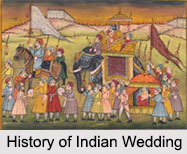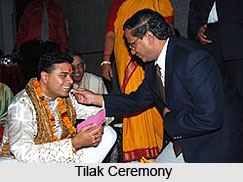 Marital duties of a couple involve the series of rules and regulations which must be followed by a man and woman after they enter the sacred institution of marriage. The conduct of the married couple decides the peaceful future of the family. The husband and wife both follow the rules in a pattern, which brings happiness and prosperity to the family. After the customary marriage ritual, the husband is bound to perform all his necessary duties. The wife is to be an image of perfection. She should keep all her husband`s secrets and never revealed the quantity of his wealth, to excel all other women in charisma of appearance, in attention to her husband, in the area of cookery, in common cleverness, in ruling her servants prudently, in hospitality, in economy, in adapting expenses to income and in supervising every minute`s circumstance of her family`s daily routine.
Marital duties of a couple involve the series of rules and regulations which must be followed by a man and woman after they enter the sacred institution of marriage. The conduct of the married couple decides the peaceful future of the family. The husband and wife both follow the rules in a pattern, which brings happiness and prosperity to the family. After the customary marriage ritual, the husband is bound to perform all his necessary duties. The wife is to be an image of perfection. She should keep all her husband`s secrets and never revealed the quantity of his wealth, to excel all other women in charisma of appearance, in attention to her husband, in the area of cookery, in common cleverness, in ruling her servants prudently, in hospitality, in economy, in adapting expenses to income and in supervising every minute`s circumstance of her family`s daily routine.
She must assist her husband in pursuing the three great aims of life: religious merit, assets and enjoyment. Neglecting enjoyment is as immoral as to be careless about religion and wealth. Such a perfect wife is termed as `Padmini`, which means `lotus-like`. Other kinds of names are `Chitrini` or a woman of varied activities; `Sankhini` or a conch-like woman and the `Hastini` means a woman resembling the elephant.
Definition of a wife has been well stated in Mahabharata, which is accurately translated as follows:
`A wife is half the man, his truest friend,
A loving wife is a perpetual spring
Of virtue, pleasure, wealth; a faithful wife
Is his best aid in seeking heavenly bliss;
A sweetly speaking wife is a companion
In solitude, a father in advice,
A mother in all seasons of distress,
A rest in passing through life`s wilderness.`
 `Smritis`, `Dharamkoshas` and Puranas have extensively written about wife`s duties. According to the Indian marital philosophy, the wife must be obedient and submissive to the husband and she is to believe her husband to be her God. The wife shall not abandon her husband, even if he were blind, impotent, powerless, degenerate, lame or sick, as stated in the `Sancta Likhita Smriti`. A good-natured wife always worships her husband, as if he were a God; this was stated in the Manu (Volume 154). Only by service to her husband can she hold on to a higher and noble position as stated in Ramayana Ayodhya Kanda, chapters 24, 26, 27. Manu Smriti in its fifth chapter, `Vishnu Dharmashastra` in chapters 25, 22, Yagnavalkya I in chapters 83-87, Mahabharata Anusasana Parva in chapter 123 and Mahabharata Vanaparva announce the conduct of righteous wives. Veda Vyasa Smriti II in chapters 20-32, Madana Parijata, Vriddaharita in chapter XI.84, Smriti Chandrika Vyrahara Kanda and others well define at length on the duties of a wife.
`Smritis`, `Dharamkoshas` and Puranas have extensively written about wife`s duties. According to the Indian marital philosophy, the wife must be obedient and submissive to the husband and she is to believe her husband to be her God. The wife shall not abandon her husband, even if he were blind, impotent, powerless, degenerate, lame or sick, as stated in the `Sancta Likhita Smriti`. A good-natured wife always worships her husband, as if he were a God; this was stated in the Manu (Volume 154). Only by service to her husband can she hold on to a higher and noble position as stated in Ramayana Ayodhya Kanda, chapters 24, 26, 27. Manu Smriti in its fifth chapter, `Vishnu Dharmashastra` in chapters 25, 22, Yagnavalkya I in chapters 83-87, Mahabharata Anusasana Parva in chapter 123 and Mahabharata Vanaparva announce the conduct of righteous wives. Veda Vyasa Smriti II in chapters 20-32, Madana Parijata, Vriddaharita in chapter XI.84, Smriti Chandrika Vyrahara Kanda and others well define at length on the duties of a wife.
In Mahabharata Anusasana Parva 126, there is a discussion between Sandili and Samna in the talk that was exchanged between Bhishma and Yudhishthira. Sandili was asked how she had attained the blissful abode. Sandili replied to Bhishma thus:
`I reposed confidence in my husband. I did whatever my husband did. I never talked harshly to my husband at any time or on any occasion. I avoided for myself such foods and drinks that are disliked by my husband. I never adorned myself whenever he was away from the village. I served with care and attention, when he returned from his sojourn. I never talked standing on the threshold of my house. I used to get up from my bed early and do my duties. I worshipped the gods, Brahmins and parents in law. I discharged my family responsibilities. I performed my marital duties.`
The Hindu society, as a custom strictly teaches the wives obedience, performance of duty and spirit of adjustment. Women in Hindu households learn the above mannerisms at parental homes.



















